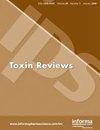水产养殖和海产品中的真菌毒素和产毒真菌:综述和新展望
IF 2.4
4区 医学
Q2 TOXICOLOGY
引用次数: 4
摘要
食品真菌毒素污染已成为一个严重的全球性食品安全问题。霉菌毒素如果通过受污染的饲料和食品摄入,除了给食品工业造成经济损失外,还会危害人类和动物健康。近年来,水生环境中的真菌毒素已成为动物和人类关注的重要原因。由于水产食品的广泛消费,确定这些污染物的含量对人类来说至关重要。到目前为止,只进行了几项调查,以评估这些有毒物质在各种海洋物种及其食物中的含量。对生海产品和加工海产品食用组织中产霉菌毒素的污染情况和各种真菌毒素的含量进行了综述。研究结果显示,受感染海产品中最常见的菌种是曲霉属和青霉属。此外,海产品中含有不同程度的真菌毒素,包括AFs、ENs、DON、ZEA和OTA,这些真菌毒素对人体健康都有危害。产真菌毒素的真菌可以生长在新鲜和不受欢迎的加工海鲜上。食用海产品最严重的风险之一是接触真菌毒素。受污染海产品中的优势菌种为曲霉和青霉。真菌毒素包括AFs, ENs, DON, ZEA和OTA可以在海鲜中找到。本文章由计算机程序翻译,如有差异,请以英文原文为准。
Mycotoxins and mycotoxigenic fungi in aquaculture and seafood: a review and new perspective
Abstract Food contamination with mycotoxins has now become a serious global food safety issue. Mycotoxins can harm human and animal health if consumed through contaminated feed and food, in addition to creating economic losses in the food industry. Mycotoxins in aquatic environments have been a substantial cause of concern for both animals and humans in recent years. It is critical for humans to identify the quantities of these contaminants in aquatic food products due to their widespread consumption. Until yet, only a few investigations have been conducted to assess the extent of these toxicants in various marine species and their foodstuffs. The amount of contamination with mycotoxigenic fungus and the quantities of various kinds of mycotoxins in the edible tissues of raw and processed seafood were assessed in this review research. According to the research results, the most common species in infected seafood are Aspergillus sp. and Penicillium sp. Additionally, seafood contains varying levels of mycotoxins, including AFs, ENs, DON, ZEA, and OTA, all of which are hazardous to human health. Highlights Mycotoxigenic fungi can grow on fresh and undesirable processed seafood. One of the most acute risks of seafood consumption is exposure to mycotoxins. Aspergillus sp. and Penicillium sp. are the predominant species in contaminated seafood. Mycotoxins including AFs, ENs, DON, ZEA, and OTA can be found in seafood.
求助全文
通过发布文献求助,成功后即可免费获取论文全文。
去求助
来源期刊

Toxin Reviews
医学-毒理学
CiteScore
6.80
自引率
0.00%
发文量
36
审稿时长
>12 weeks
期刊介绍:
Toxin Reviews provides an international forum for publishing state-of-the-art reviews and guest-edited single topic special issues covering the multidisciplinary research in the area of toxins derived from animals, plants and microorganisms. Our aim is to publish reviews that are of broad interest and importance to the toxinology as well as other life science communities. Toxin Reviews aims to encourage scientists to highlight the contribution of toxins as research tools in deciphering molecular and cellular mechanisms, and as prototypes of therapeutic agents. Reviews should emphasize the role of toxins in enhancing our fundamental understanding of life sciences, protein chemistry, structural biology, pharmacology, clinical toxinology and evolution. Prominence will be given to reviews that propose new ideas or approaches and further the knowledge of toxinology.
 求助内容:
求助内容: 应助结果提醒方式:
应助结果提醒方式:


